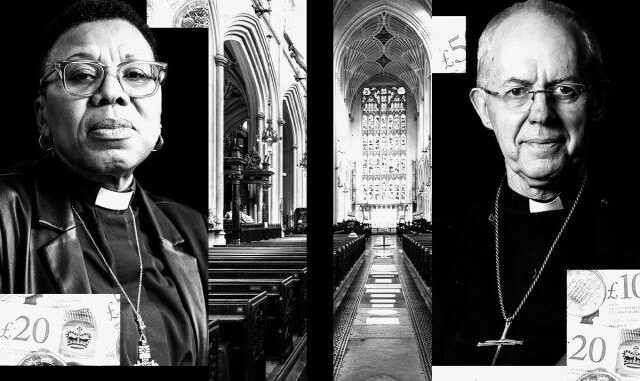
The Church of England has been told it needs to raise £1 billion ($1.27 billion) from wealthy donors to set up a fund to address its historic links to slavery.
Church leaders have already been told the £100 million it has already set aside is “insufficient”.

BYPASS THE CENSORS
Sign up to get unfiltered news delivered straight to your inbox.
You can unsubscribe any time. By subscribing you agree to our Terms of Use
Latest Video
Archbishop of Canterbury Justin Welby has promised to address its “shameful past.” He said the recommendations were “the beginning of a multi-generational response to the appalling evil of trans-Atlantic chattel enslavement.”
The Church of England appears to have allowed itself to be captured by race-baiters who are fleecing them in broad daylight.
The Telegraph reports: In January last year, the Church Commissioners, who handle more than £10 billion of assets for the Church of England, announced the establishment of a £100 million fund to “address past wrongs of slavery”.
The pledge came following the publication of a report which found that much of the institution’s wealth originates from the slave trade.
A report published on Monday by an independent Oversight Group has concluded that the £100 million fund will be too small and too slow to deliver on its aims, as it called for the target to be increased to £1 billion.
However, the Church of England is being urged to raise the remaining £900 million from wealthy donors, companies and investors. It is hoped that the extra funding, combined with the interest accrued by the fund, will allow the church to reach its new target.
The Group said that the Church Commissioners had “embraced a target of £1 billion for a broader healing, repair and justice initiative with the fund at its centre” because the original £100 million sum is “insufficient” to counter the “historic and enduring greed, cynicism and hate with penitence, hope and love”.
It added that its original nine-year timeframe has also been judged too long and, as a result, the Church Commissioners will disburse their £100 million over five years.
Following consultation with members of the global African diaspora, the report recommends that the new impact investment fund be called the Fund for Healing, Repair and Justice and that it will invest in members of disadvantaged black communities, aiming to “back their most brilliant social entrepreneurs, educators, healthcare givers, asset managers and historians”.
The recommendations call on the Church Commissioners to use this fund to invest in black-led businesses focusing on education – such as schools, or a community-run pharmacy chain to improve health outcomes – and access to land and food as well as provide grants to address these and other issues brought up for communities impacted by the legacies of African chattel enslavement.
The Church’s endowment fund can be partly traced back to 1704 when Queen Anne’s Bounty was established to help support impoverished clergy. Queen Anne’s Bounty funds were subsumed into the Church Commissioners’ endowment when it was created in 1948.
In 2022, the Church of England announced for the first time – “and with great dismay” – that the Bounty had invested significant amounts of its funds in the South Sea Company, which was founded in 1711 and shipped enslaved people from Africa across the Atlantic.
The Church estimated that the South Sea Company transported 34,000 slaves “in crowded, unsanitary, unsafe and inhumane conditions” during its 30 years of operation.
Asked how the Church was planning to raise the £900 million, Geetha Tharmaratnam, Vice-Chairwoman of the independent Oversight Group, said: “The intention is that this is a fund that can be taken to peers of Church Commissioners, to pension funds, sovereign wealth funds, to impact investors, foundations, family offices, exactly the kind of investors who are looking to create positive change for the future.
“And in doing so, our hope is that we will get to the billion pounds that we have set as an intention and strong target.
“There is room for this to get to a billion and beyond,” she added. “And for us as an Oversight Group to have suggested a smaller number would have not given sufficient service to what this fund can accomplish.”


